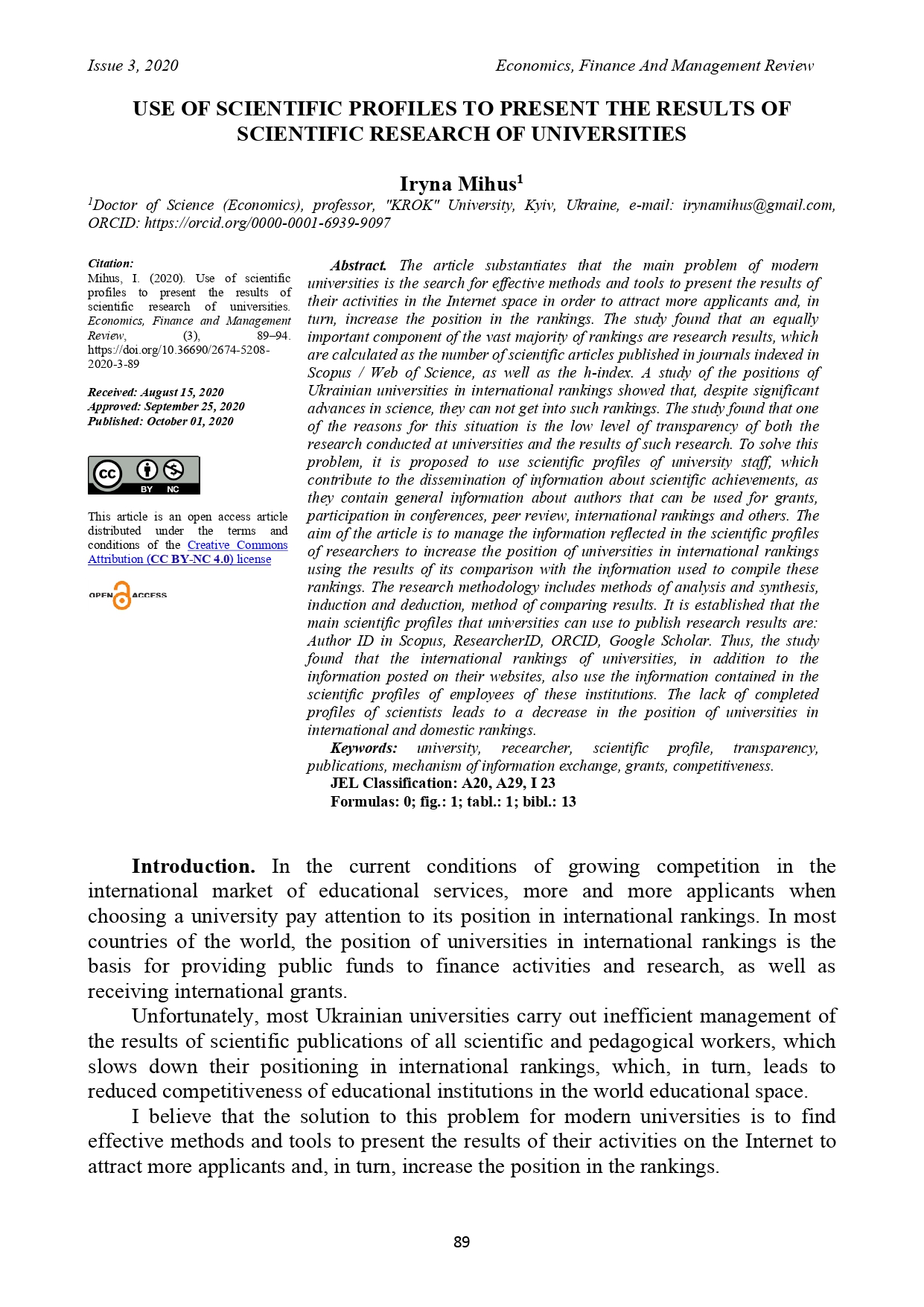USE OF SCIENTIFIC PROFILES TO PRESENT THE RESULTS OF SCIENTIFIC RESEARCH OF UNIVERSITIES
DOI:
https://doi.org/10.36690/2674-5208-2020-3-89Keywords:
university, recearcher, scientific profile, transparency, publications, mechanism of information exchange, grants, competitivenessAbstract
The article substantiates that the main problem of modern universities is the search for effective methods and tools to present the results of their activities in the Internet space in order to attract more applicants and, in turn, increase the position in the rankings. The study found that an equally important component of the vast majority of rankings are research results, which are calculated as the number of scientific articles published in journals indexed in Scopus / Web of Science, as well as the h-index. A study of the positions of Ukrainian universities in international rankings showed that, despite significant advances in science, they can not get into such rankings. The study found that one of the reasons for this situation is the low level of transparency of both the research conducted at universities and the results of such research. To solve this problem, it is proposed to use scientific profiles of university staff, which contribute to the dissemination of information about scientific achievements, as they contain general information about authors that can be used for grants, participation in conferences, peer review, international rankings and others. The aim of the article is to manage the information reflected in the scientific profiles of researchers to increase the position of universities in international rankings using the results of its comparison with the information used to compile these rankings. The research methodology includes: methods of analysis and synthesis, induction and deduction, method of comparing results. It is established that the main scientific profiles that universities can use to publish research results are: Author ID in Scopus, ResearcherID, ORCID, Google Scholar. Thus, the study found that the international rankings of universities, in addition to the information posted on their websites, also use the information contained in the scientific profiles of employees of these institutions. The lack of completed profiles of scientists leads to a decrease in the position of universities in international and domestic rankings.
Downloads
References
Mihus I., Cherevko О. Radzihovska U. (2016). Marketing approach to the improvement of interface security of institutions of higher education. Zbirnyk naukovykh prats Cherkaskoho derzhavnoho tekhnolohichnoho universytetu. Seriia: Ekonomichni nauky, 1 (43). doi: http://dx.doi.org/10.24025/2306-4420.1.43.2016.120077
The official site of IREG Observatory on Academic Ranking and Excellence, Retrieved from: http://ireg-observatory.org.
The official site of Academic Ranking of World Universities, Retrieved from: http://www.shanghairanking.com.
The official site of the QS World University Rankings, Retrieved from: https://www.topuniversities.com/university-rankings.
The official site of the Sci Verse Scopus. Retrieved from: https://www.elsevier.com/solutions/scopus.
The official site of the Times Higher Education. Retrieved from: https://www.timeshighereducation.com/world-university-rankings.
The official site of the Ranking Web of Universities. Retrieved from: http://www.webometrics.info/en.
The official site of the SCImago Institutions Rankings. Retrieved from: http://www.scimagoir.com/.
Hreben S., Mihus I., Parashchenko L., Laptіev S. and Alkema V. (2019), The mechanism of financial control over the allocation of budgetary funds depending on the results of scientific activity of a higher education institution. Finansovo-kredytna diialnist: problemy teorii ta praktyky, №4(31), рр. 466-476. DOI: http://dx.doi.org/10.18371/fcaptp.v4i31.190998.
The official site of Scopus, Retrieved from: http://www.scopus.com/.
The official site of Web of Science, Retrieved from https://publons.com/.
The official site of ORCID, Retrieved from: https://orcid.org/.
The official site of Google Scholar, Retrieved from: https://scholar.google.com.ua.

Downloads
Published
How to Cite
Issue
Section
License

This work is licensed under a Creative Commons Attribution-NonCommercial 4.0 International License.








